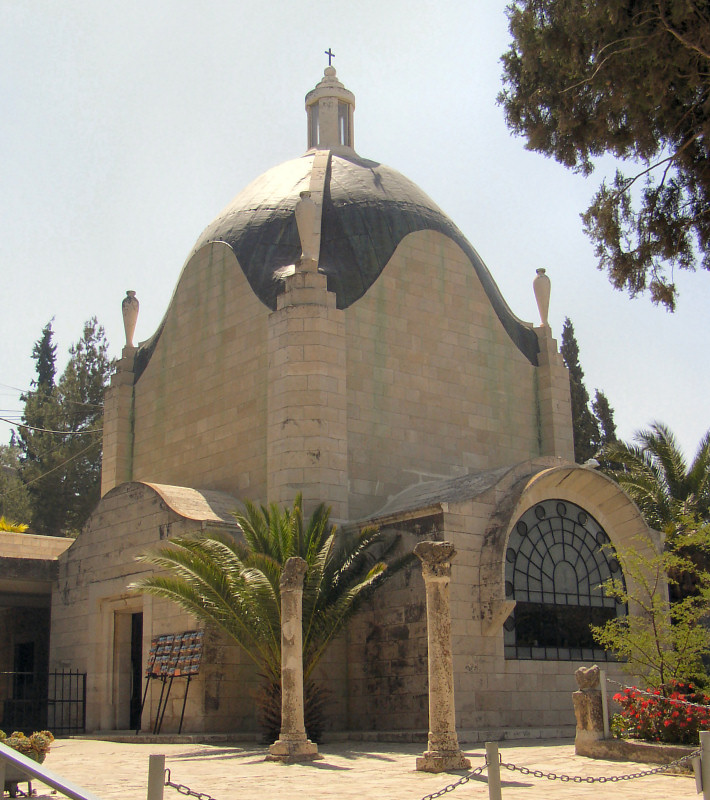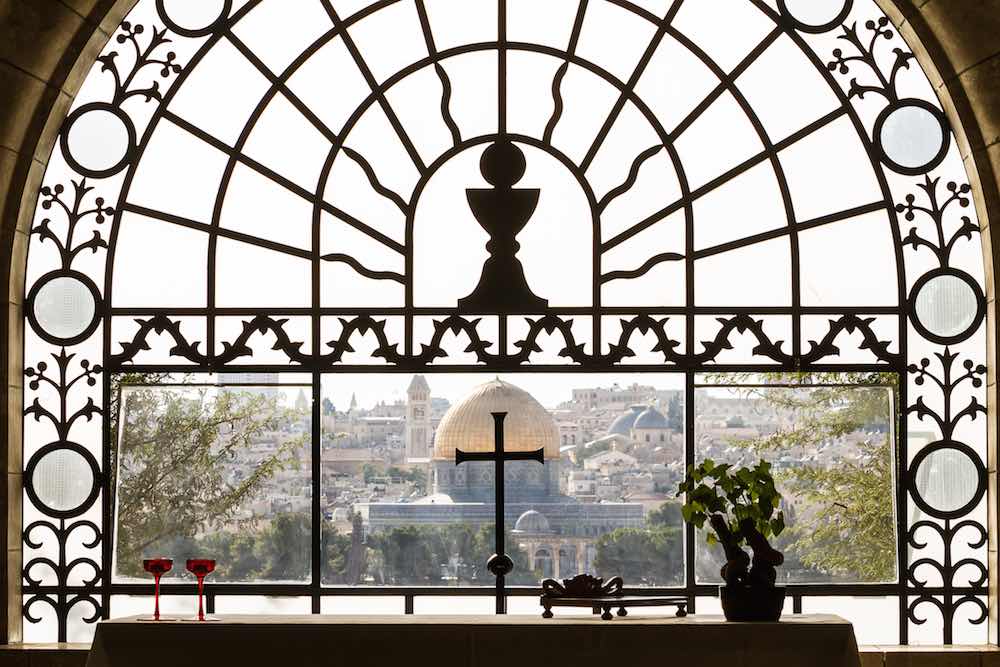
As he drew near, he saw the city and wept over it, saying, “If this day you only knew what makes for peace—but now it is hidden from your eyes. For the days are coming upon you when your enemies will raise a palisade against you; they will encircle you and hem you in on all sides. They will smash you to the ground and your children within you, and they will not leave one stone upon another within you because you did not recognize the time of your visitation.” Luke 19:41-44
Today, a church marks the place where Jesus wept over Jerusalem. It sits about half way between the Mount of Olives and the entry to Old City. Built in the shape of a tear drop, it is aptly named Dominus Flevit – “the Lord Wept.”
The window behind its altar provides a panoramic view over Jerusalem, encouraging the pilgrim to imagine what Christ saw as he wept over the city. However, whereas the most prominent spectacle in Jesus’ time would have been the Temple, today the Temple Mount is topped by the Dome of the Rock, an Islamic shrine built upon the site where Mohammed is believed to have prayed and begun his journey into Heaven. Of course, it is also the place where Abraham prepared to sacrifice his son, Isaac. It is the place where King Solomon built a temple to house the very presence of God. It is the place where Jesus was presented in the temple by his parents, Mary and Joseph. And it is the place where they found him as a young boy, when he amazed all who heard him by his understanding and his answers.

Considering the Biblical history of this special place, the significance of what it once contained, and the fall of the people that its destruction symbolized, it is easy to understood why the Lord wept. Jesus wept, knowing that the Jewish people would be encircled and hemmed in on all sides. He wept, aware of the coming persecutions. Most of all, he wept, knowing that the people of Jerusalem did not know “what makes for peace”… they did not know him.
It is easy for the Christian of today to want to weep as they stand, gazing at the site of a massive Muslim shine erected on such a significant site. The temple was lost. But, as St. Paul told the Athenians, “The God who made the world and all that is in it, the Lord of Heaven and Earth, does not dwell in sanctuaries made by human hands.” (Acts 17:24) In fact, the veil of the temple had already been torn in two upon Christ’s death. The physical structure which separated man from God was no longer necessary. As Catholic Christians, we are now able to live in full communion with Christ. Through our baptism, through which the Holy Spirit dwells within us, and through the Sacraments – especially the Eucharist and Reconciliation – we dwell fully with Christ, in Christ, and for Christ. “You are a temple of God and … the Spirit of God dwells in you,” St. Paul explained to the Corinthians (Cor 3:16, emphasis added).
Gazing through the window of the Dominus Flevit church, we see the cross situated perfectly in front of the Dome of the Rock, and the Eucharist directly above it. No building can be erected which supersedes that which we hold within ourselves – the very presence of God, gifted through Baptism and renewed through our prayers and our celebration of the Sacraments. As temples of the Holy Spirit, called to “rejoice in the Lord always” (Phil 4:4), we no longer weep, but rejoice in the knowledge that Christ was victorious on the cross, and that one day “every knee will bend, and every tongue swear” that he is the Lord (Isa 45:23). We rejoice, knowing that, while Christ lamented, “if this day you only knew what makes for peace,”… we do, in fact know what makes for peace. Christ.
In this place, 2000 years ago, Jesus wept. In this place, and around the world, today we rejoice, secure in the knowledge of faith that Jesus is Lord, that he gives us peace, and that he is always near.
“Rejoice in the Lord always. I shall say it again: rejoice! Your kindness should be known to all. The Lord is near. Have no anxiety at all, but in everything, by prayer and petition, with thanksgiving, make your requests known to God. Then the peace of God that surpasses all understanding will guard your hearts and minds in Christ Jesus.” Phil 4:4-7
Would you like to visit the Holy Land and the Dominus Flevit Church? Check out our featured pilgrimage below, our click here to view all of our upcoming Holy Land pilgrimages.



